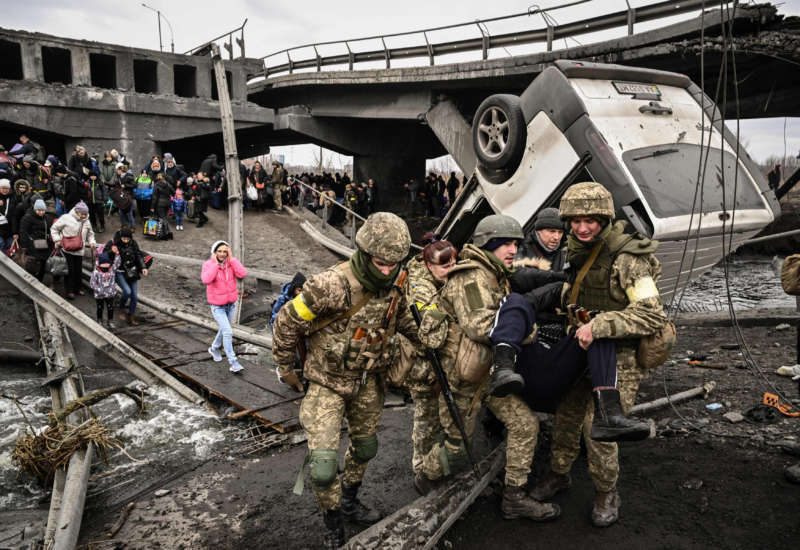Imagine that you, as a refugee from extreme violence in Ukraine, called your family across the border for help — and were flatly told they did not believe you, that there was no war. You’ve witnessed the indiscriminate shelling of your city, including your own apartment building. You have been hiding in a train station with a thousand others as the crash and smash of an artillery bombardment shakes the rubble from the cracked ceiling. You’ve seen dead people, soldiers and civilians, left in the street. If this is not real, “real” does not exist. How can your relatives in Russia not know this is happening?
The Washington Post explains:
As Ukrainians deal with the devastation of the Russian attacks in their homeland, many are also encountering a confounding and almost surreal backlash from family members in Russia, who refuse to believe that Russian soldiers could bomb innocent people, or even that a war is taking place at all.
These relatives have essentially bought into the official Kremlin position: that President Vladimir V. Putin’s army is conducting a limited “special military operation” with the honorable mission of “de-Nazifying” Ukraine. Mr. Putin has referred to the Ukrainian president, Volodymyr Zelensky, a native Russian speaker with a Jewish background, as a “drug-addled Nazi” in his attempts to justify the invasion.
Those narratives are emerging amid a wave of disinformation emanating from the Russian state as the Kremlin moves to clamp down on independent news reporting while shaping the messages most Russians are receiving.
It is estimated that there are approximately 11 million people in Russia with relatives in Ukraine. It would be an act of stupendous hubris for Russian President Vladimir Putin to believe he could keep so many in the dark about the reality of Ukraine, but this is exactly what he has endeavored to do. Most of what passed for an independent press in Russia has been swept away, and overwhelmingly, the information being provided comes from Russian state media. There is no war, they preach, no mass civilian displacement. This is a limited act of liberation to free Ukraine from Nazi control by way of precision strikes on military targets only, they say, with Russian soldiers bringing food and warm clothes to all affected civilians.
It is an absolute wonder, however thoroughly horrifying, that Putin is attempting to pull off a gaslighting of such magnitude. Russia is not North Korea, isolated nearly entirely by an all-controlling authoritarian state. Russia is a world power, and has a booming international oil and gas business that has made itself globally indispensable even as Putin rains war crimes down on a neighbor. Indeed, it is that very energy sector that has saved it from the worst possible sanctions so far. Attack Russia’s oil economy and the rest of Europe — which depends heavily on Russian oil — could go dark, badly rattling the resolve of NATO in the face of crumbling economies and a restive population.
However, Russia’s disinformation campaign should not look entirely unfamiliar to us in the United States. Let us not forget that, not so long ago, we were led into a long and bloody war under the false pretenses of “weapons of mass destruction,” which reverberated across mainstream media. In certain media sectors, those official lies echo strongly to this day.
And then, there is the lie-based future Donald Trump and his allies have been striving to construct for the U.S. for the last seven years. Any story not in praise of Trumpism is immediately labeled false, backed by an anti-logic that mangles civic discourse beyond recognition. Even trying to deconstruct a Trumpist’s “fake news” charge is a victory for the one leveling it, because it means you have accepted the premise that it could be fake news, thus giving partisans just enough of a peg to hang their hat on.
With a tight enough media bubble, reinforced by the long-espoused idea that other viewpoints stem from evil sources and must be shunned as a moral imperative, a segment of any population can be manipulated and even controlled in ways that leave those outside looking in astonished and stunned. While Trump likely would not have been able to hide a whole war with a neighbor, he has painted a masterwork of disinformation about COVID-19, masks, vaccines and basic safety measures. Tens of millions have bought what he is peddling, to the ongoing detriment of the COVID fight, leaving the country badly fractured and unable to escape the gravity well of the pandemic.
Russia’s disinformation campaign should not look entirely unfamiliar to us in the U.S.
Yet, we in the U.S. independent media know well that state attempts to manipulate public opinion cannot easily quell grassroots movements. Where there is war and repression, there is resistance, and the same is true in Russia in this moment. More than 13,000 antiwar protesters have been arrested in Russia, and still they come.
And resistance to the tyranny of the outside invaders is a touchstone of the Ukrainian ethos. They will not surrender it lightly.
Meanwhile, those of us in the United States, confronting Putin’s disinformation machine, must not assume that it can be torn down by sanctions, our own military and state mechanisms of information warfare. Rather, we must take note of the fact that if many thousands of Russians are protesting in the face of massive state repression, grassroots channels of information are being used and new ones created. We must work our hardest to amplify our own channels for truth, particularly those that lift up grassroots resistance movements. As Khury Petersen-Smith writes in Truthout, “Our challenge is to build protest across borders that stands in solidarity with those facing the violence of war, and is independent — and defiant of — the governments where we reside.”
If Voice of America can do it in the name of U.S.-sponsored propaganda, we can do it for the truth, for Ukraine, and for people everywhere suffering through a starvation diet of lies.


